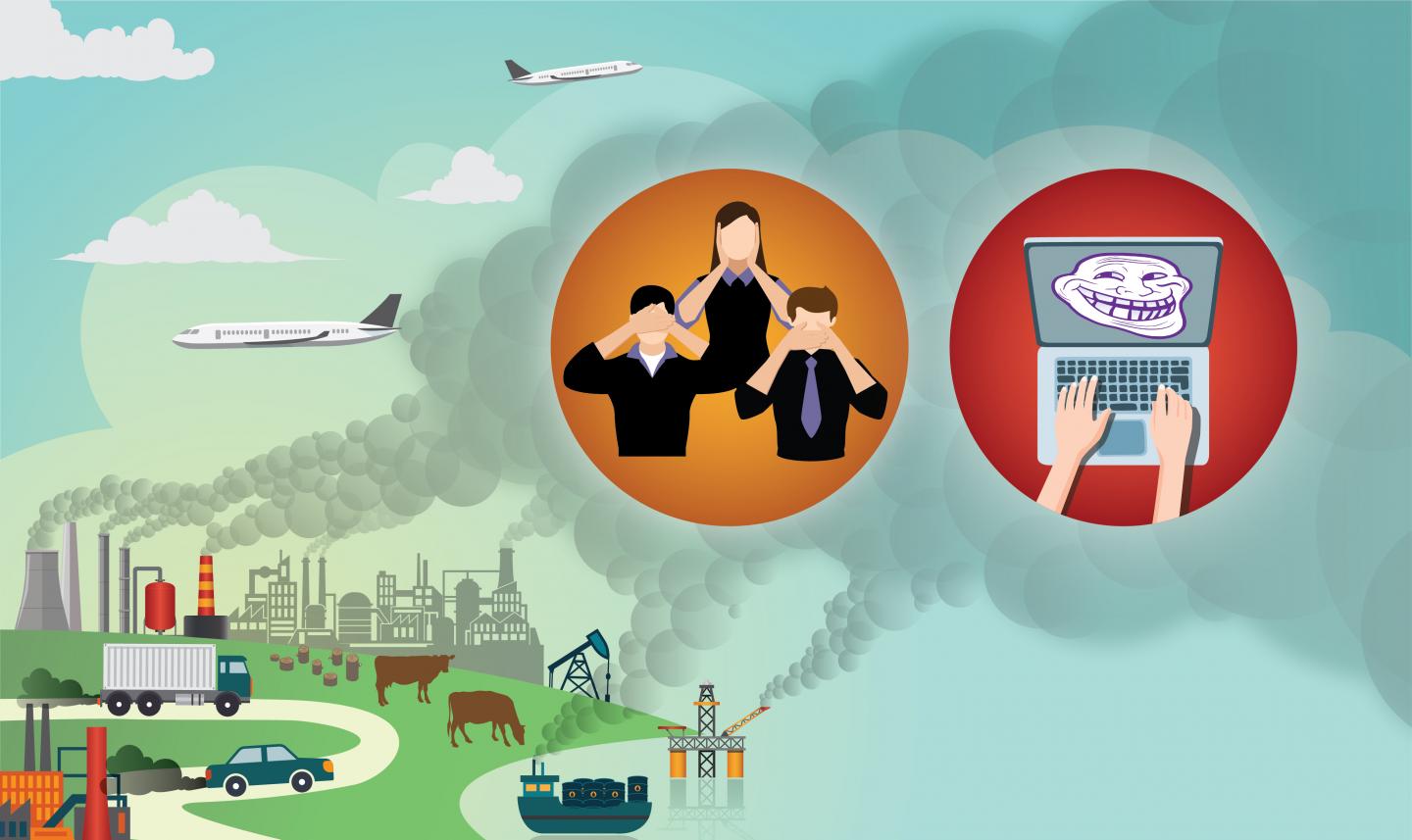From Ben Shapiro fanboys to the flat-earther variety of climate change ‘skeptics’ on Twitter to our own beloved politicians telling us things like, “climate change nahi hua hai, hum change ho gaye hai”– climate change deniers come in various shapes and forms. While some of them think that climate change is a ‘Chinese hoax’ and others believe that people who live in coastal areas can apparently just sell their what-would-surely-be-flooded property- there’s no denying that all of them hold an unwavering opinion- that climate change just isn’t a thing.
Too bad the science (which they would deny anyway) isn’t on their side. And the evidence is immense and compelling. And has been for the past decades. So where does this ‘rational’ skepticism come from? Whom does it benefit? Well, this tendency to deny the facts about the earth warming up due to human activity has always been there. Conservatives have always chosen to look the other way when presented with facts and research and the rise of the populist right-wing worldwide shows us that they still do.
But we’re seeing climate change manifest itself frequently into extreme weather events such as uncontrollable forest fires, massive floods, and prolonged droughts all over the world. And we’re witnessing an overwhelmingly large number of young people all over the world seek climate action from their governments. So is the wave of denial still riding high? The question is tricky, and the answer even trickier. According to a YouGov study of 30,000 people in 28 countries, the majority of respondents very much agreed that the climate is changing and that human activity is somewhat responsible for it.
So that’s good news. More good news? At 71%, people in India were most likely to have this opinion. Let’s put this information in contrast to America- at 6%, the US has the highest percentage of people out of all the 28 countries who don’t believe on climate change. What’s special about both India and the US is that along with China, they make up the team of the three largest emitters of CO2. And while people’s attitudes in these two countries may vary, their governments seem to be dancing to the same tune; that of not taking climate change seriously.
Since we’re talking emissions, let’s not forget that only 100 companies are responsible for more than 70% of the world’s greenhouse gas emissions and have been since 1988. Exxon Mobil, Royal Dutch Shell, Chevron, and Total are some of the honorable mentions
Since we’re talking emissions, let’s not forget that only 100 companies are responsible for more than 70% of the world’s greenhouse gas emissions and have been since 1988. Exxon Mobil, Royal Dutch Shell, Chevron, and Total are some of the honorable mentions because their misinformation campaigns against climate change are very much responsible for the presence of strong roots of denial that are present today in people’s minds and for the absence of what should be an equally strong sense of urgency in the conversation around climate change.
Environmentalists who are trolled mercilessly today for wanting to save the Earth have it no better than those who were labeled ‘alarmists’ back in the 70s and the 80s. And of course, these climate deniers target women. In their piece for the Conversation Australia, authors Tracy Raney and Mackenzie Gregory explain, “Research shows that climate deniers are more likely to adhere to older forms of industrial modern masculinity that helped to push society towards “industrialization, mechanism and capitalism.”
Also read: Is The Water Crisis In India The Beginning Of Climate Breakdown?
Let’s come back to India now. It’s not as much as the outright denial-ism that of the likes of Donald Trump but the constant hypocrisy of the Indian government when addressing the issue of climate change which stands out. Speaking at the UN Climate Summit in New York in September, PM Modi was just too confident about being the “Champion of the Earth”, and very strongly declared to world leaders that, “Time for talks on climate is over, world needs to act“. He was all praises of his government’s efforts to switch to renewable energy. There’s just one problem with that. Remember those companies responsible for the majority of emissions? Coal India is one of them. It’s the world largest coal mining company and quite central to the Indian energy market and will likely remain so.
The Modi government has in the past cut the budget of the Ministry of Environment, Forests, and Climate Change by a quarter, and done the same to the Ministry of New and Renewable Energy.
The Modi government has in the past cut the budget of the Ministry of Environment, Forests, and Climate Change by a quarter, and done the same to the Ministry of New and Renewable Energy. Environmental groups, activists, and NGOs have constantly been under attack. A significant number of people who were protesting against the Mumbai government’s decision to cut down trees in the Aarey forest to build a metro car shed were even put in jail not so long after the UN Climate Action Summit. Adivasi activists are punished more harshly- it’s not just their lands that are taken, they are put in jail and their struggle is ignored by the big media. The Indian government is always a little too quick choose development over environmental protection at the expense of marginalized communities- who while contributing the least to climate change are in fact affected the most.
While Trump and Modi might not have the exact same stand on climate change, their outright denial and deep-rooted hypocrisy over the issue proves that they are pretty much two peas of the same pod. And though the Indian government just can’t seem to make up its mind about whether or not it wants to protect the environment, it should not be silent on the lives that are lost to extreme weather events all over India almost every year now. It should instead be actively investing in renewable sources of energy, devising strong and holistic policies to tackle the toll that extreme weather events such as floods and droughts bring with them, and it should most definitely stop cutting down more trees in the name of development.
Also read: Do You Know These Young PoC & Indigenous Climate Activists Fighting For The Future?
As climate action becomes the talk of the town and Indians grow more concerned about the country’s environmental woes- there’s no should be no two ways about the Indian government’s commitment to take action against climate change. Climate is definitely changing, so it’s only for better that the government’s stance on it changes too.
Featured Image Source: Eurek Alert
About the author(s)
Purnima is a wannabe writer and a want-to-be cat mom.




